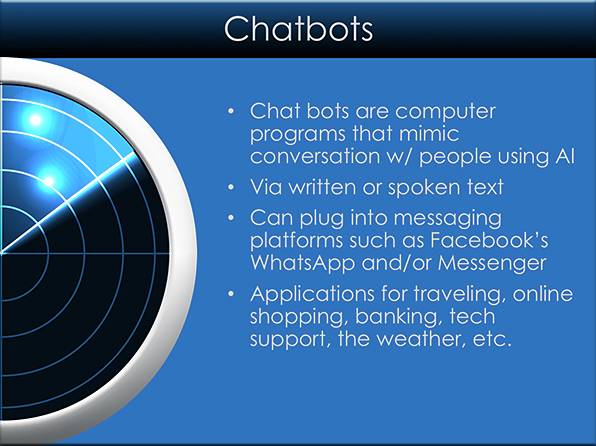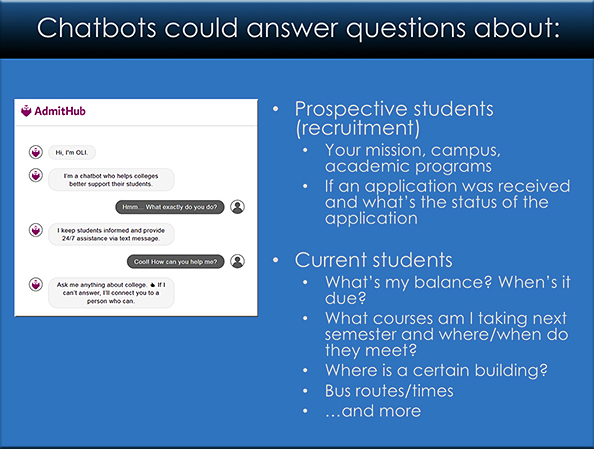What is Artificial Intelligence, Machine Learning and Deep Learning — from geospatialworld.net by Meenal Dhande


What is the difference between AI, machine learning and deep learning? — from geospatialworld.net by Meenal Dhande
Excerpt:
In the first part of this blog series, we gave you simple and elaborative definitions of what is artificial intelligence (AI), machine learning and deep learning. This is the second part of the series; here we are elucidating our readers with – What is the difference between AI, machine learning, and deep learning.
You can think of artificial intelligence (AI), machine learning and deep learning as a set of a matryoshka doll, also known as a Russian nesting doll. Deep learning is a subset of machine learning, which is a subset of AI.

Chatbot for College Students: 4 Chatbots Tips Perfect for College Students — from chatbotsmagazine.com by Zevik Farkash
Excerpts:
1. Feed your chatbot with information your students don’t have.
Your institute’s website can be as elaborate as it gets, but if your students can’t find a piece of information on it, it’s as good as incomplete. Say, for example, you offer certain scholarships that students can voluntarily apply for. But the information on these scholarships are tucked away on a remote page that your students don’t access in their day-to-day usage of your site.
So Amy, a new student, has no idea that there’s a scholarship that can potentially make her course 50% cheaper. She can scour your website for details when she finds the time. Or she can ask your university’s chatbot, “Where can I find information on your scholarships?”
And the chatbot can tell her, “Here’s a link to all our current scholarships.”
The best chatbots for colleges and universities tend to be programmed with even more detail, and can actually strike up a conversation by saying things like:
“Please give me the following details so I can pull out all the scholarships that apply to you.
“Which department are you in? (Please select one.)
“Which course are you enrolled in? (Please select one.)
“Which year of study are you in? (Please select one.)
“Thank you for the details! Here’s a list of all applicable scholarships. Please visit the links for detailed information and let me know if I can be of further assistance.”
2. Let it answer all the “What do I do now?” questions.
3. Turn it into a campus guide.
4. Let it take care of paperwork.
From DSC:
This is the sort of thing that I was trying to get at last year at the NGLS 2017 Conference:
18 Disruptive Technology Trends For 2018 — from disruptionhub.com by Rob Prevett
Excerpts:
1. Mobile-first to AI-first
A major shift in business thinking has placed Artificial Intelligence at the very heart of business strategy. 2017 saw tech giants including Google and Microsoft focus on an“AI first” strategy, leading the way for other major corporates to follow suit. Companies are demonstrating a willingness to use AI and related tools like machine learning to automate processes, reduce administrative tasks, and collect and organise data. Understanding vast amounts of information is vital in the age of mass data, and AI is proving to be a highly effective solution. Whilst AI has been vilified in the media as the enemy of jobs, many businesses have undergone a transformation in mentalities, viewing AI as enhancing rather than threatening the human workforce.
…
7. Voice based virtual assistants become ubiquitous
Google HomeThe wide uptake of home based and virtual assistants like Alexa and Google Home have built confidence in conversational interfaces, familiarising consumers with a seamless way of interacting with tech. Amazon and Google have taken prime position between brand and customer, capitalising on conversational convenience. The further adoption of this technology will enhance personalised advertising and sales, creating a direct link between company and consumer.
5 Innovative Uses for Machine Learning — from entrepreneur.com
They’ll be coming into your life — at least your business life — sooner than you think.
Philosophers are building ethical algorithms to help control self-driving cars – from qz.com by Olivia Goldhill
Tech’s Ethical ‘Dark Side’: Harvard, Stanford and Others Want to Address It — from nytimes.com by Natasha Singerfeb
Excerpt:
PALO ALTO, Calif. — The medical profession has an ethic: First, do no harm.
Silicon Valley has an ethos: Build it first and ask for forgiveness later.
Now, in the wake of fake news and other troubles at tech companies, universities that helped produce some of Silicon Valley’s top technologists are hustling to bring a more medicine-like morality to computer science.
This semester, Harvard University and the Massachusetts Institute of Technology are jointly offering a new course on the ethics and regulation of artificial intelligence. The University of Texas at Austin just introduced a course titled “Ethical Foundations of Computer Science” — with the idea of eventually requiring it for all computer science majors.
And at Stanford University, the academic heart of the industry, three professors and a research fellow are developing a computer science ethics course for next year. They hope several hundred students will enroll.
The idea is to train the next generation of technologists and policymakers to consider the ramifications of innovations — like autonomous weapons or self-driving cars — before those products go on sale.










